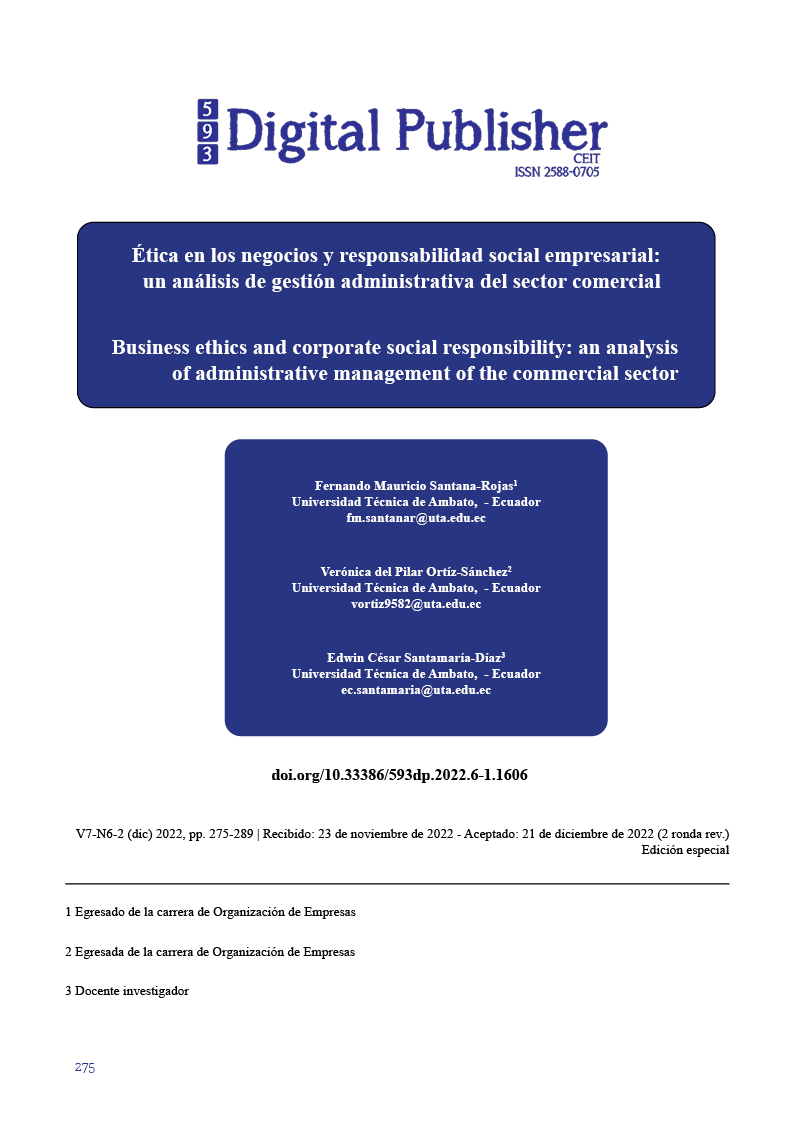Business ethics and corporate social responsibility: an analysis of administrative management of the commercial sector
Main Article Content
Abstract
The problematic contingents have been related to business ethics, corporate social responsibility, perceived green marketing, brand loyalty, and have been related to the exploitation of the environment caused by technologies, which has affected society. The objective of the study was to determine the influence of business ethics on corporate social responsibility and its perception of consumer loyalty in Tungurahua. The applied method had a quantitative approach since the connection between perceived business ethics and social responsibility in commercial companies was evaluated based on the correlational scope. The applied examinee was probabilistic in a simple random order of 384 people. The results revealed that most of the clients did not perceive business ethics and corporate social responsibility (CSR) as separate constructs. However, it was evidenced that companies improved their corporate social responsibility (CSR) and green marketing practices to formulate sustainability strategies based on the aforementioned factors.
Downloads
Article Details

This work is licensed under a Creative Commons Attribution-NonCommercial-ShareAlike 4.0 International License.
1. Derechos de autor
Las obras que se publican en 593 Digital Publisher CEIT están sujetas a los siguientes términos:
1.1. 593 Digital Publisher CEIT, conserva los derechos patrimoniales (copyright) de las obras publicadas, favorece y permite la reutilización de las mismas bajo la licencia Licencia Creative Commons 4.0 de Reconocimiento-NoComercial-CompartirIgual 4.0, por lo cual se pueden copiar, usar, difundir, transmitir y exponer públicamente, siempre que:
1.1.a. Se cite la autoría y fuente original de su publicación (revista, editorial, URL).
1.1.b. No se usen para fines comerciales u onerosos.
1.1.c. Se mencione la existencia y especificaciones de esta licencia de uso.
References
Aaker, D. A., & Jacobson, R. (2001). The Value Relevance of Brand Attitude in High-Technology Markets. Journal of Marketing Research, 37(4), 485–493.
Aguirre, C., Ruiz, S., Palazón, M., & Augusto, R. (2021). El rol del eWOM en la comunicación de RSC en redes sociales. Anagramas Rumbos y Sentidos de la Comunicación, 19(38), 1-24.
Ahluwalia, R. (2018). Corporate Social Responsibility in India: Evolution Continuum of Philanthropic Practices Rosy. IJRAR- International Journal of Research and Analytical Reviews, 8(2), 559-564. https://doi.org/10.23872/aj/2018/v8/i2/180670
Aristizábal, C., Restrepo, M., & Arias, J. E. (2007). Impactos Del Mercadeo Social En Organizaciones De Servicios*. Semestre Economico, 10(19), 11. Recuperado de http://www.scielo.org.co/scielo.php?script=sci_arttext&pid=S0120-63462007000100008&lang=pt
Armstrong, G., & Kotler, P. (2013). Fundamentos de Marketing. (P. de la Vega, Ed.) (Decimo pri). México D.F.: Cámara Nacional de la Industria Editorial Mexicana.
Awad, A., Mohammad, N., & Abdalqader, K. (2019). Work Ethics and Social Responsibility: Actual and Aspiration. Journal of Management Research, 12(1), 26-36. https://doi.org/10.5296/jmr.v12i1.15794
Bedoya, L., Sánchez, X., & Sánchez, S. (2021). Ética y responsabilidad social como mecanismos de formación integral para el ejercicio profesional del Contador. Entramado, 17(2), 146-161. https://doi.org/10.18041/1900-3803/entramado.2.7829
Braun, A., & Rusminingsih, D. (2021). Social Responsibility and Human Resource Management in the Hotel Industry in Malaysia. SPLASH Magz, 1(2), 63-67. https://doi.org/10.54204/splashmagzvol1no1pp63to67
Carroll, A.B. (1991), “The pyramid of corporate social responsibility: toward the moral management of organizational stakeholders”, Business Horizons, Vol. 34 No. 4, pp. 39-48.
Carroll, A.B. (1979), “A three-dimensional conceptual model of corporate performance”, Academy of Management Review, Vol. 4 No. 4, pp. 497-505.
Colmenares, O., & Saavedra, J. (2017). Aproximación teórica de la lealtad de marca: enfoques y valoraciones. Cuadernos de Gestion, 7(2), 69-81.
Cornelissen, G., Dewitte, S., Warlop, L., & Yzerbyt, V. (2007). Whatever people say I am, that’s what I am: Social labeling as a social marketing tool. International Journal of Research in Marketing, 24(4), 278-288. https://doi.org/10.1016/j.ijresmar.2007.05.001
Cronin, J.J., Smith, J.S., Gleim, M.R., Ramirez, E. and Martinez, J.D. (2011), “Green marketing strategies: an examination of stakeholders and the opportunities they present”, Journal of the Academy of Marketing Science, Vol. 39 No. 1, pp. 158-174.
Fernández, J., & Bajo, A. (2012). La Teoría del Stakeholder o de los Grupos de Interés, pieza clave de la RSE, del éxito empresarial y de la sostenibilidad. Adresearch Esic International Journal of Communication Research, 6(6), 130-143. https://doi.org/10.7263/adr.rsc.006.07
Ferreira, L., Carvalho, S., Bittencourt, J., & Ribeiro, D. (2021). Sustainability, ethics and social responsibility in organizations: a theoretical reflection. Brazilian Journal of Development, 7(7), 72666-72690. https://doi.org/10.34117/bjdv7n7-444
Gamba, E. A., & García, J. L. de la F. (2013). Responsabilidad social corporativa, actividades empresariales y desarrollo sustentable. Modelo matemático de las decisiones en la empresa. Contaduría y Administración, 58(3), 227-248.
García, L., & Calvo, C. (2016). Medición del Valor el modelo de Aaker. Universdiade Da Coruña.
Gopinath, R. (2019). Corporate governance’s responsibilities in socially. International Journal of Advance and Innovative Research, 6(May), 137-141.
Goske, M. J., Applegate, K. E., Boylan, J., Butler, P. F., Callahan, M. J., Coley, B. D., … Strauss, K. J. (2008). Image GentlySM: A National Education and Communication Campaign in Radiology Using the Science of Social Marketing. Journal of the American College of Radiology, 5(12), 1200-1205. https://doi.org/10.1016/j.jacr.2008.06.007
Granados Hernández, M., & Muñoz Rojas, D. (2015). Factores que inciden en la calidad de vida de las personas adultas mayores. Revista Enfermería Actual en Costa Rica, ISSN-e 1409-4568, No. 29, 2015 (Ejemplar dedicado a: Edición Actual:Edición No.29 julio-diciembre 2015), (29), 3.
Hernández, R., Fernández, C., & Baptista, M. (2014). Metodología de la investigación. (M.-H. / I. E. S.A., Ed.) (Sexta). Delegación Álvaro Obregón: McGraw Hill.
Inggrit, L., Herlambang, A., & Evans, B. (2022). Corporate social responsibility and leverage level on high profile industries at indonesian stock exchange of 2015-2019 period. Media Ekonomi dan Manajemen, 37(1), 1-16. https://doi.org/10.24856/mem.v27i01.2285
Irigaray, H. A. R., Vergara, S. C., & Santos, M. C. F. (2013). Responsabilidade Social Corporativa: Um Duplo Olhar Sobre a Reduc. Revista de Administração Mackenzie, 14(6), 82-111. Recuperado de http://search.proquest.com/docview/1500942666?accountid=17195%5Cnhttp://ubucat.ubu.es/search*spi~S1/i?SEARCH=%5Cnhttp://193.146.160.29/gtb/usuario_acceso.php?centro=$UBUG¢ro=$UBUG/
Jacoby, J. and Chestnut, R.W. (1978), Brand Loyalty: Measurement and Management, Wiley, New York, NY.
Kang, J. and Hustvedt, G. (2014), “Building trust between consumers and corporations: the role of consumer perceptions of transparency and social responsibility”, Journal of Business Ethics, Vol. 125 No. 2, pp. 253-265.
Kumer, S., Sarker, P., & Chandra, S. (2022). Raising Perceptions on Corporate Social Responsibility for Achieving Sustainable Development Goals. Business and Economic Research, 12(1), 1-16. https://doi.org/10.5296/ber.v12i1.19223
Lizcano, J., & Lombana, J. (2018). Responsabilidad Social Corporativa (RSC). Civilizar (Vol. 18). https://doi.org/10.22518/usergioa/jour/ccsh/2018.1/a08
Luque, A., Coronado, J., & Álvarez, J. (2021). Análisis de los procesos de responsabilidad social empresarial a través de 113 conceptos. Revista Prisma Social, 35(4), 31-64.
Manasakis, C. (2018). Business ethics and corporate social responsibility. Managerial and Decision Economics, 39(4), 486-497. https://doi.org/10.1002/mde.2921
Mancheno, M., & Gamboa, J. (2018). EL BRANDING COMO HERRAMIENTA PARA EL POSICIONAMIENTO EN LA INDUS- TRIA COSMETICA. Universidad y Sociedad, 10(1), 82-88.
Masaquiza, C., Ballesteros, L., & González, L. (2017). Análisis de los stakeholders como insumo de entrada en el diseño de un plan publicitario. Universidad, Ciencia y Tecnología, 01(Especial), 60-67.
Medeiros, H., & Arruda, S. (2021). Rethinking State Social Responsibility With the Creation of Shared Public Value. International Journal of Business Administration, 12(1), 44-56. https://doi.org/10.5430/ijba.v12n1p44
Mohammed, S., Aloqo, A., Hakim, A., Ahmad, J., Hammouri, Q., & Nusairat, N. (2021). Work Ethics and Corporate Social Responsibility: The Mediating Role of Marketing Competence. Annals of R.S.C.B, 25(6), 17647-17665.
Morillo, J. P., & Hernández, R. P. de. (2009). El mercadeo social/estratégico de los productos/servicios y la definición del perfil de competencias del profesional de la información. Documentación de las Ciencias de la Información, 32, 179-192. https://doi.org/-
Ochoa, E. (2017). Incidencia De Las Prácticas De Responsabilidad Social Empresarial En La. Universidad Militar Nueva Granada.
Pavlyshyn, O., Ustymenko, T., Babiuk, M., Kaida, N., & Shkrebets, D. (2021). ocial Responsibility as a Performance Indicator of Public Authorities. Academic Journal of Interdisciplinary Studies, 10(3), 111-122. https://doi.org/10.36941/AJIS-2021-0068
Pegels, A., Heyer, S., Ohlig, D., Kurz, F., Laux, L., & Morley, P. (2021). ¿Es sostenible el reciclaje? Propuestas para conciliar los aspectos sociales, ecológicos y económicos en Argentina. Germanny: Deutsches Institut für Entwicklungspolitik (DIE). https://doi.org/http://dx.doi.org/10.23661/dp10.2021 This
Pérez, R.C. (2009). Effects of perceived identity based on corporate social responsibility: the role of consumer identification with the company, Corporate Reputation Review, Vol. 12 No. 2, pp. 177-191.
Puriwat, W., & Tripopsakul, S. (2022). Consumers’ Attitude towards Digital Social Responsibility: Impacts on Electronic Word of Mouth and Purchase Intention. Emerging Science Journal, 6(1), 64-74. https://doi.org/10.28991/ESJ-2022-06-01-05
Rendueles, M. (2010). Mercadeo social, responsabilidad social y balance social: conceptos a desarrollar por instituciones universitarias. Telos: Revista de Estudios Interdisciplinarios en Ciencias Sociales, 12(1), 29-42. Recuperado de http://search.ebscohost.com/login.aspx?direct=true&db=fua&AN=59564671&lang=es&site=ehost-live
Şahin, A. (2018). How Principles of Business Ethics Relates to Corporate Governance and Directors? European Journal of Economics and Business Studies, 4(3), 22-27. https://doi.org/10.26417/ejes.v4i3.p22-27
Said, L., Anisah, H., Firdaus, M., Rusniati, R., & Rachman, M. (2022). The Impact of Perceived Benefits of Corporate Social Responsibility Initiatives on Wetland Farming Communities in Indonesia. WSEAS Transactions on Business and Economics, 19(7), 402-413. https://doi.org/10.37394/23207.2022.19.36
Sánchez, R., & Cabrera, I. (2021). Gerencia y responsabilidad social: construcción colectiva desde la complejidad y la acción comunicativa. TELOS: Revista de Estudios Interdisciplinarios en Ciencias Sociales, 23(1), 100-114.
Schwalb, M. (2011). RSE en America Latina. En La Responsabilidad social de la empresa en America latina (pp. 87-110).
Seghyar, N., Nafzaoui, M., & Ahmed, H. (2022). Management and control tools for corporate social responsibility: between the proactive strategy and the adaptive csr strategy empirical study of large companies in morocco. Journal of Tianjin University Science and Technology ISSN, 55(1), 45-69. https://doi.org/10.17605/OSF.IO/QGFB3
Talavera, C., & Sanchis, J. (2021). Ética y Responsabilidad Social en las alianzas estratégicas. El caso de las alianzas entre entidades lucrativas y no lucrativas. REVESCO Revista de Estudios Cooperativos, 137(137), 1-19. https://doi.org/10.5209/reve.73863
Tanna, A., Melo, D., & Ferreira, L. (2021). Business ethics and corporate social responsibility in times of covid-19. Risus-Journal on Innovation and Sustainability, 12(3), 4-11.
Tavares Ana Teresa, E. R. (2015). Marketing social: de curto passado a futuro promissor. Revista Portuguesa e Brasileira de Gestão, 14, 26-36. Recuperado de http://www.scielo.gpeari.mctes.pt/scielo.php?script=sci_arttext&pid=S1645-44642015000300004&lang=pt
Torres, N. (2022). Responsabilidad social empresarial de los estudios contables de la ciudad de Pilar. Ciencia Latina Revista Multidisciplinaria, 6(1), 1-17.
Triola, M. (2009). Estadística. (R. Fuerte, F. Hernández, & J. García, Eds.) (Décima). Atlacomulco, México: Cámara Nacional de la Industria Editorial Mexicana.
Valencia, W., & Janqui, M. (2022). La responsabilidad social empresarial y el desarrollo sostenible en latinoamerica en tiempos de pandemia. Ciencia Latina Revista Científica Multidisciplinar, 6(1), 415-435. https://doi.org/10.37811/cl_rcm.v6i1.1507
Valenzuela, L., Jara, M., & Villegas, F. (2015). Prácticas de Responsabilidad Social, reputación corporativa y desenpeño financiero. Revista de Administração de Empresas, 18(1), 20-31.
Vargas, S., Ruiza, S., & Vargas, M. (2018). Ética, responsabilidad social empresarial y formación profesional. Mikarimin. Revista Científica Multidisciplinaria, 4(1), 1-10.
Vettorazzo, D. (2017). Maximización de ganancias a través de la mezcla de productos en PyMES. Universidad Nacional de Luján.




